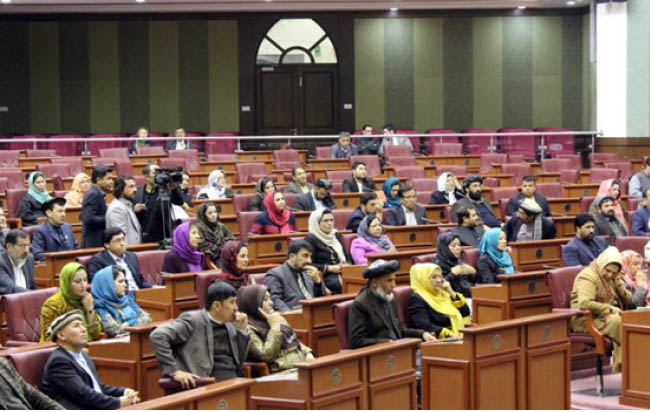KABUL - Wolesi Jirga members on Wednesday continued to differ over the decision of a joint parliamentary commission on the population census law.
Some lower house members called the decision as ‘legal’ while others demanded further debate on the amendment of Article six of the controversial law.
The process of issuing the much-awaited computerized National Identity Cards (e-NICs) was expected to begin on Tuesday and President Ashraf Ghani and Chief Executive Officer (CEO) Abdullah were said to be the first receiving their new e-NICs but the process was delayed for unknown reasons.
Lawmaker Kamal Nasir Osoli from southeastern Khost province, the joint commission of the upper and lower houses had already approved the amendment to Article six of the census law.
“If some lawmakers want amendment to the law, they should do it through legal procedure,” said Osoli, in a reference to lawmakers opposed to the addition of ethnicity and tribe in the ID cards.
“A law which is approved should not be debated based on a few signatures,” he said, alleging mafia groups were behind efforts to include the amendment of Article six in the house agenda. “No one would be allowed to use the Constitution for personal interests,” the lawmaker warned.
His colleague from eastern Nangarhar province Aryan Yun said joint commissions of both the houses had approved many laws in the past.
She said the amendment to the Article six of the census law had been approved and debating it was a waste of time.
Nader Khan Katawazai, a lawmaker from Paktia province said: “If the presidential decree regarding the Article six was illegal, it should have not been included in the agenda. In the past, some laws were approved by the joint commissions, in which equal member of the members were not present.”
Katawazai said the 17 joint sessions of the parliament, most of the time the number of delegations had not been equal.
Abdul Qayyum Sajadi, a lawmaker from Ghazni province, said the meeting of the joint commission was against Article 100 of the Constitution and the issue should be included in the agenda for more debate and exchange of lawmakers’ viewpoint.
Under the relevant law, if one House rejects a decision of the other, a joint commission comprised of an equal number of members from each House is formed to solve the difference.
The decision of the joint commission, after endorsement by the President, shall be enforced. If the joint commission does not solve the difference, the decision shall be considered rejected.
In such a situation, the House of People shall pass it with two-thirds majority in its next session. This decision, without submission to the House of Elders, shall be promulgated once endorsement by the President.
Lower house Speaker Abdul Rauf Ibrahimi termed the decision of the joint commission as ‘legal’ and said the issue had been shared in the meeting by the heads of commissions, but insufficient votes led to excluding the subject from the agenda.
He added 75 members of the house had demanded the issue not to be made part of the agenda while 56 lawmakers demanded the subject to be made part of the agenda.
The controversial census law has recently landed in the Parliament with a presidential legislative decree amending Article six of the law, but the Wolesi Jirga again disapproved it, while the Mesharano Jirga has approved the law.
For a unanimous decision, a joint commission of the two houses held discussion and approved the law which was then sent to the President for endorsement. (Pajhwok)
Home » Afghanistan » MPs Divided over More Debates on Census Law
MPs Divided over More Debates on Census Law

